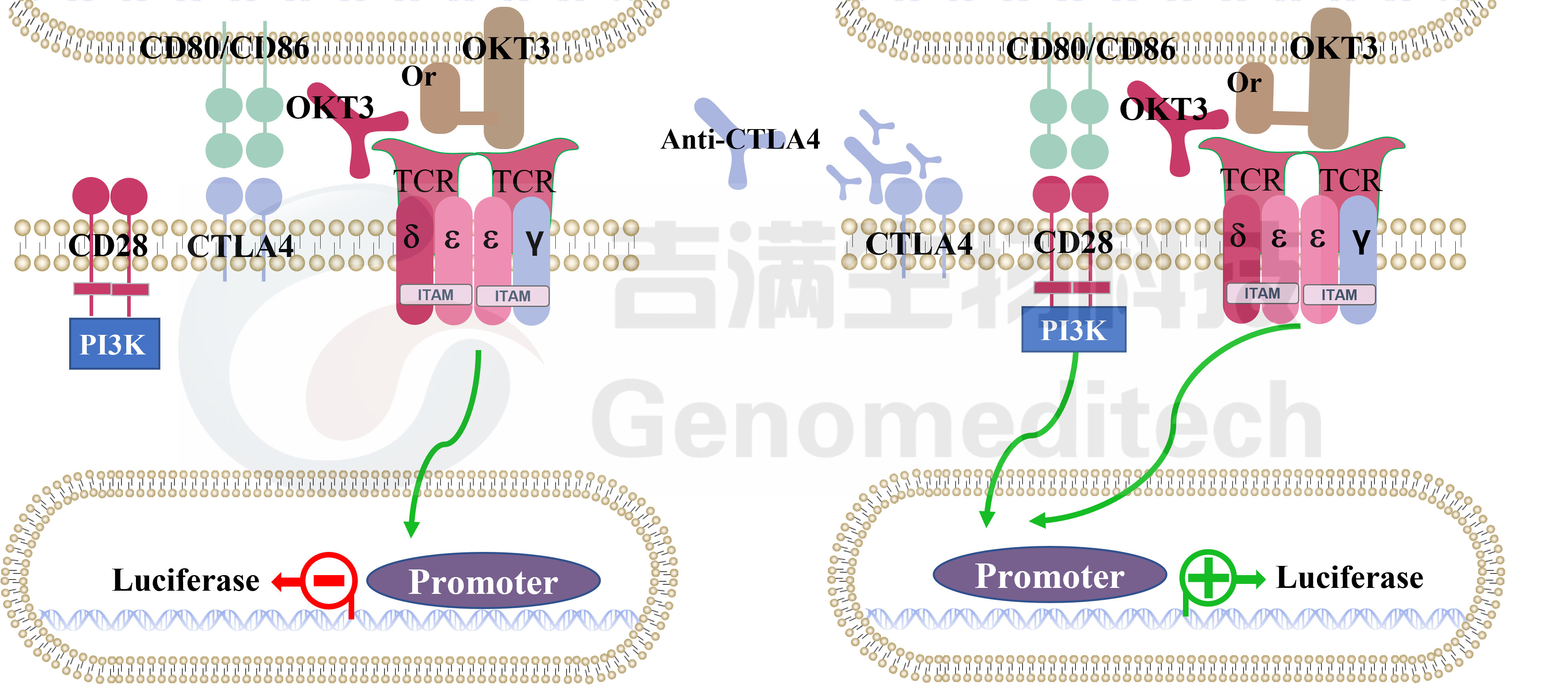Cat. No:GM-032AS009
Product:H_CTLA4 Reporter Blockade Assay (Raji)

Cat. No:GM-032AS009
Product:H_CTLA4 Reporter Blockade Assay (Raji)

Cell Growth Medium:RPMI 1640+10% FBS+1% P.S+3.5 μg/mL Blasticidin+0.75 μg/mL Puromycin
Cell Freezing Medium:90% FBS+10% DMSO
Assay Buffer:RPMI 1640+1% FBS +1% P.S
CTLA-4, also known as CD152, is an immune inhibitory receptor expressed constitutively on regulatory T cells (Treg) that plays a crucial role in regulating immune responses. When CTLA4 is upregulated on the surface of T cells, it binds with higher affinity to CD80 (B7-1) or CD86 (B7-2) than CD28, leading to the induction of T cell unresponsiveness. Research has shown promising prospects in clinical trials for various cancers using antibodies and Fc fusion proteins that block the interaction between CTLA4/CD80 and CD86.
Current methods for evaluating the potential bioactivity of agents targeting CTLA-4 rely on measuring functions of human T cells and effector molecules such as cell proliferation, cell surface marker expression, and production of interferon-gamma (IFNγ) and interleukin-2 (IL-2). These assays are challenging to establish in a quality-controlled drug development environment due to reliance on donor primary cells, complex assay protocols, and unreliable test reagents.
Genomeditech H_CTLA4 Reporter Jurkat Cell Line is a reporter gene cell line stably expressing the H_CTLA4 gene and luciferase reporter gene. When co-cultured with Raji cells stably expressing human CD80 and CD86, the interaction between CTLA4/CD80 or CD86 inhibits the transduction of the TCR signaling pathway and expression of luciferase. Addition of a CTLA4-blocking antibody reverses this inhibition, leading to TCR signaling pathway activation and luciferase expression, which can be used to assess the efficacy and stability of antibodies and other biological agents targeting CTLA-4/CD80 or CD86 interaction.
Cat. No:GM-032AS009
Product:H_CTLA4 Reporter Blockade Assay (Raji)

Cell Growth Medium:RPMI 1640+10% FBS+1% P.S+3.5 μg/mL Blasticidin+0.75 μg/mL Puromycin
Cell Freezing Medium:90% FBS+10% DMSO
Assay Buffer:RPMI 1640+1% FBS +1% P.S
CTLA-4, also known as CD152, is an immune inhibitory receptor expressed constitutively on regulatory T cells (Treg) that plays a crucial role in regulating immune responses. When CTLA4 is upregulated on the surface of T cells, it binds with higher affinity to CD80 (B7-1) or CD86 (B7-2) than CD28, leading to the induction of T cell unresponsiveness. Research has shown promising prospects in clinical trials for various cancers using antibodies and Fc fusion proteins that block the interaction between CTLA4/CD80 and CD86.
Current methods for evaluating the potential bioactivity of agents targeting CTLA-4 rely on measuring functions of human T cells and effector molecules such as cell proliferation, cell surface marker expression, and production of interferon-gamma (IFNγ) and interleukin-2 (IL-2). These assays are challenging to establish in a quality-controlled drug development environment due to reliance on donor primary cells, complex assay protocols, and unreliable test reagents.
Genomeditech H_CTLA4 Reporter Jurkat Cell Line is a reporter gene cell line stably expressing the H_CTLA4 gene and luciferase reporter gene. When co-cultured with Raji cells stably expressing human CD80 and CD86, the interaction between CTLA4/CD80 or CD86 inhibits the transduction of the TCR signaling pathway and expression of luciferase. Addition of a CTLA4-blocking antibody reverses this inhibition, leading to TCR signaling pathway activation and luciferase expression, which can be used to assess the efficacy and stability of antibodies and other biological agents targeting CTLA-4/CD80 or CD86 interaction.